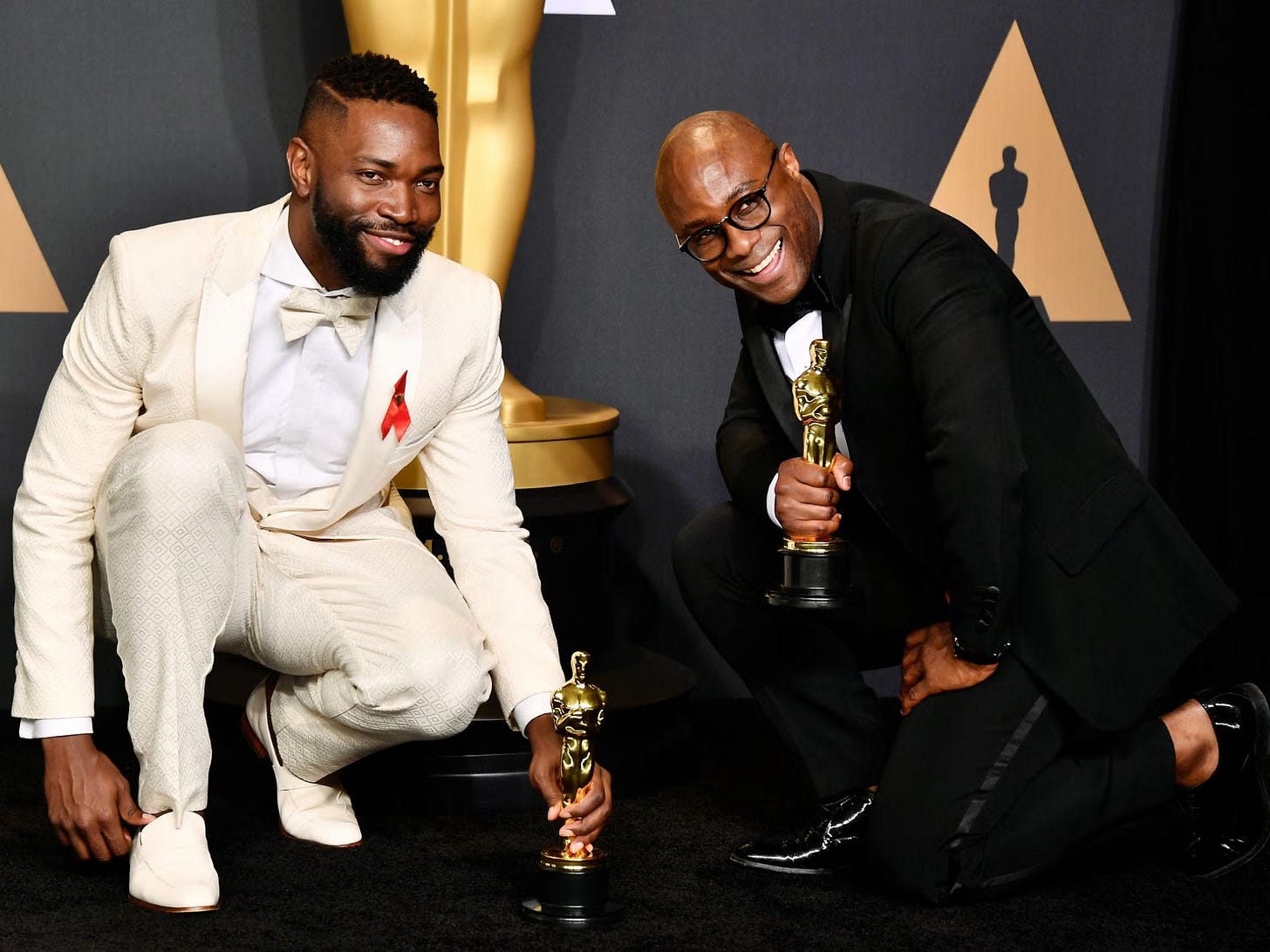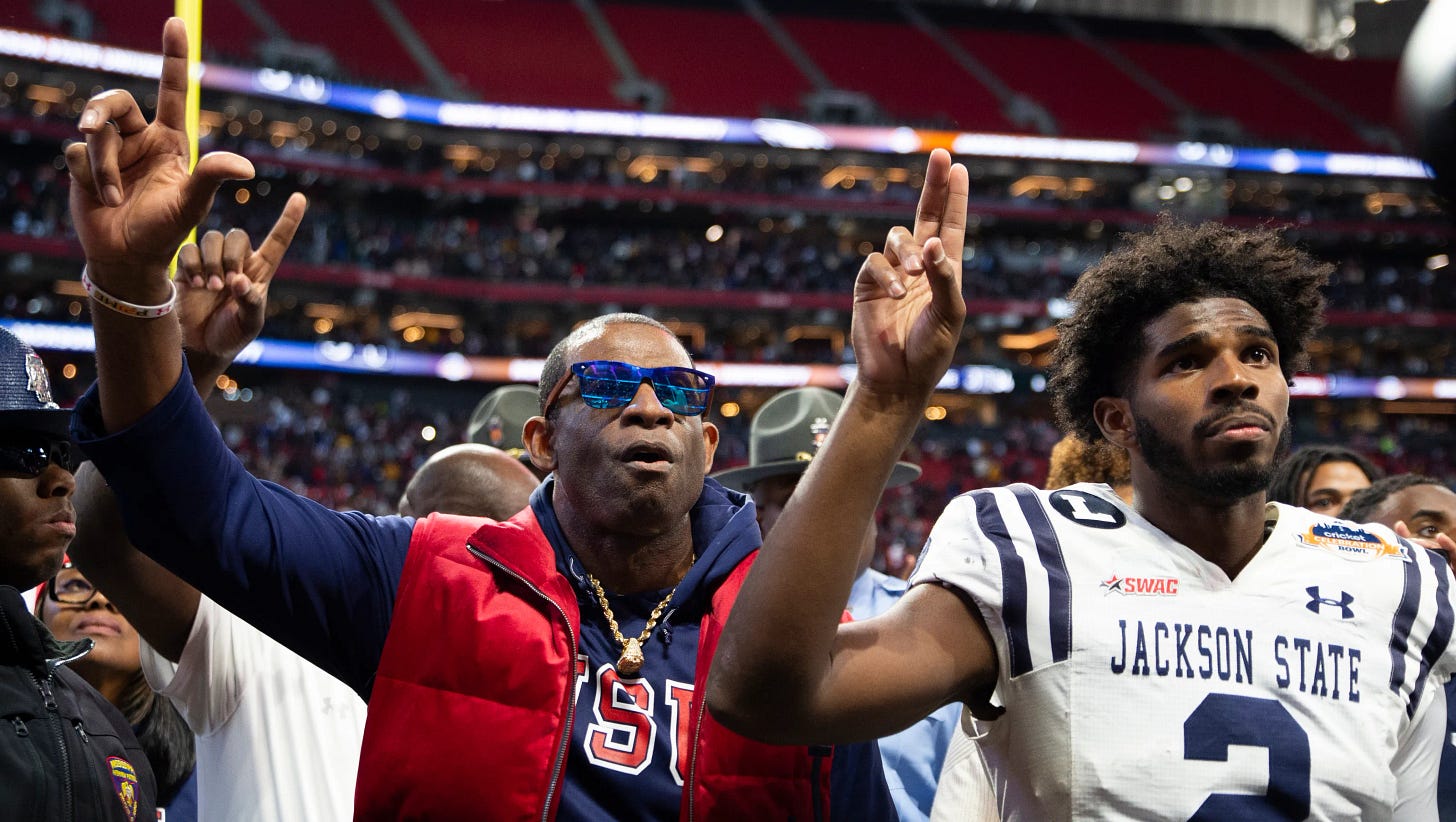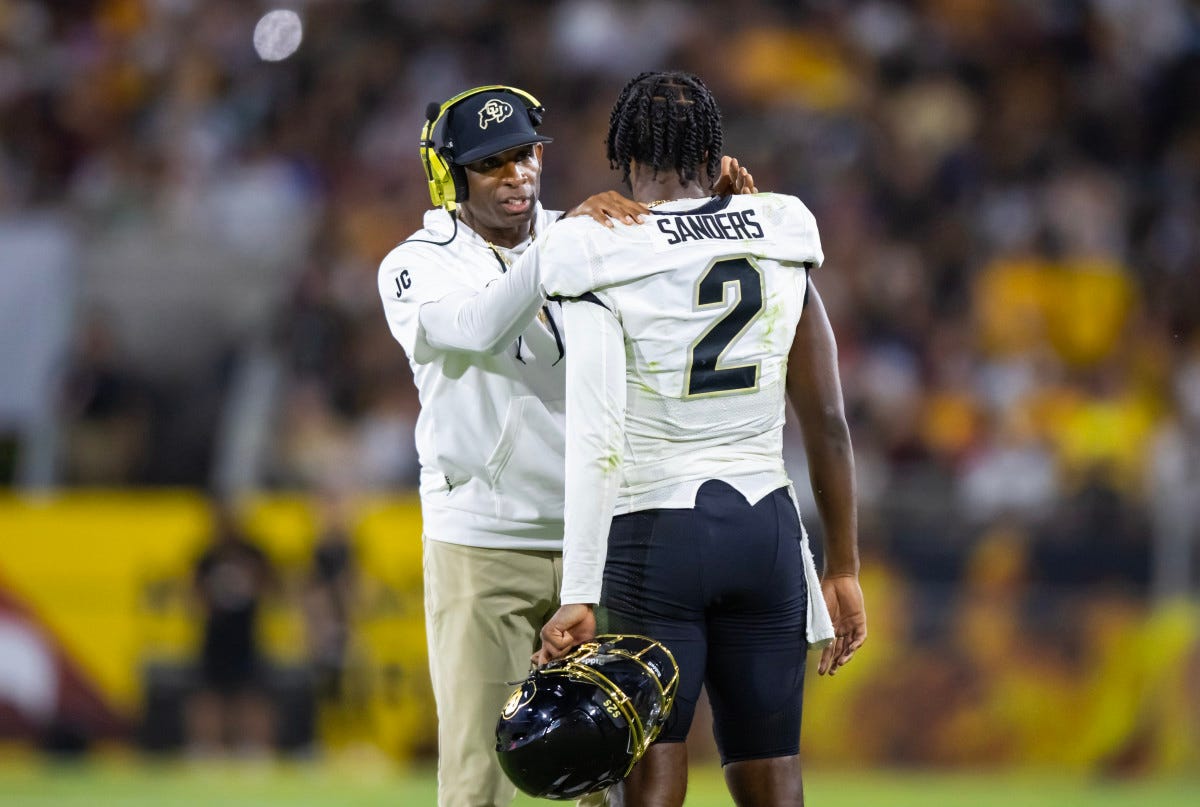Deion Sanders and Black Excellence
How would college football change if more former players like Sanders followed in his footsteps at other HBCUs?
Today, well over 50 years removed from the height of the Civil Rights Movement, it may be hard for us to imagine the choices that our black foreparents faced back then and for the decades and centuries before. One foundational issue that they faced was that of integration. Removing the legal and social barriers that kept blacks from advancing in this country was one of the main goals of the Civil Rights Movement.
Many of those legal barriers have indeed been removed, and many blacks have successfully “integrated” into mainstream America. However, there still exists a significant number of blacks who have not been able to successfully integrate into America and all that it has to offer, which begs the question in hindsight, was wholesale integration the right strategy? Did an integration strategy forsake the development of a strong independent and interdependent black community with its own viable institutions?
This is the second in a series of articles where I will explore these questions in detail. In this article I will address the groundswell of support for Deion Sanders at the University of Colorado Boulder and the overall trend of supporting the positions of black success within the mainstream, or “Black Excellence” as it is so often referred. What could have been achieved if there was this level of support for him in his three years at the historically black university Jackson State? How would college football change if more former players like Sanders followed in his footsteps at other HBCUs?
Black people have personalized the success of Deion Sanders at Colorado as a collective success against white people and white systems, as personified in the wider NCAA college football system. In the light of the previous uproar of celebratory memes surrounding the Montgomery brawl, where black people came to the defense of black dock worker being assaulted by a group of white men, there is a very clear component of “sticking it to the white man” as being success enough. The racial element of the support for Colorado was recently highlighted in their 42-6 defeat at the hands of the University of Oregon as black people across Twitter complained about those reveling in the loss. The intensity of the criticisms and even insults directed at Deion Sanders were perceived by many as an attack on black success itself.
There is an irony in the collective identification of black people toward a school whose student body makeup was 2.7 percent black as of 2021 and a state whose black population is 4.7 percent. This groundswell of support for Sanders just was not there when he was heading the historically black college Jackson State from 2020-2022. One of the big reasons for the lack of support was the lack of visibility on national television for that program, despite the fact he completely turned around a a program with little success to speak of and boasted little institutional resources. This success story wasn’t enough for the narrative surrounding Sanders to break through in the way that it has this year.
It was only when Sanders moved on to the University of Colorado, which gave him a bigger platform on which to perform a similar transformation of a similarly dismal football program. The key difference though is the amount of resources the school has and its access to a more national platform and competition against the top institutions of college football. For Sanders, such a move was a no-brainer. The school provided him with a bigger opportunity with more resources that he could devote to his players and staff and a bigger stage to as a test for himself to see where he personally stood within the wider world of college football as a coach. For Sanders it was more about the challenge and avoiding complacency in a program which clearly for him was a stepping stone toward something greater.
Ultimately though this moment is beyond Deion Sanders as an individual and beyond the University of Colorado as an institution. It speaks more to the wider culture of black America. All too often there is a distinct relationship between the celebrated accomplishments of black people within the mainstream of American culture and the maintaining of a status quo of race relations within the country. YouTuber F.D Signifier hits the nail right on the head in his analysis of how the much vaunted “black excellence” almost always occurs at the expense of the advancement wider black community. We are essentially trading the monumental advancement of a few for the maintaining of a status quo of operations within the wider systems of the country.
“But there-in lies the scary part of what Black Excellence is. Because Deion can only do this work at this magnitude by submitting to being extracted out of community. Black excellence in truth is when a handful of black folks show themselves to be talented enough to be extracted out of their black spaces to be of use to white systems and institutions. And at best, while in those spaces these black folks will advocate and agitate for the greater benefit of black people. And at their worst they will work directly against black people to protect their own status. And since these institutions will often remove folks who are too aggressive for advocating for black people or agitate too much against the status quo, most commonly these folks will often do or say the bare minimum and at the end of the day we end up just stumping and clapping just happy to see one of us make it but nothing ever gets done as a community as a whole”
We as a culture have become accustomed to these symbolic victories of advancement for black people. We have been so thoroughly starved of leadership and legitimate gains politically since the Civil Rights Movement that we have come to support the success of any black person as our collective success, even when it is abundantly clear that we as a whole will not only not benefit from that success, but potentially might be actively harmed by it. We have had eight years of a black president who mostly functioned as a black face of the institution of the United States government and all of its special interest groups. Barack Obama’s personal success in becoming president was mostly to the benefit of white systems and institutions of power.
Within the football world, Jay-Z’s partnership with the NFL was used as a racial smokescreen of plausible deniability as to whether the league was blackballing Colin Kaepernick, whose refusal to stand for the national anthem brought him condemnation from across the sports world. It’s the NFL’s version of denying accusations of racism because of the existence of their black friend. This move opened up the prospect of Jay-Z becoming a co-owner of an NFL franchise diversifying the billionaire class of owners within the league. Jay-z’s advancement was at the expense of another black man.
This kind of support could also be seen in the widespread support of the Black Panther franchise. Black people would rather see and support a Marvel franchise with a black face, rather than support the black filmmakers as a whole in the same way. Barry Jenkins’ film Moonlight only enjoyed widespread support throughout the culture after its stelar showing at the Oscars in 2017, winning 8 Academy awards which included Best Picture. Unfortunately that support within the culture did not translate over into Jenkins’ subsequent projects. Instead of seeing more black films reaching wider audiences we are limiting ourselves to the “black movie event” of the year with movies such as Black Panther. Once again, the platform of mainstream success matters more.

As F.D. Signifier points out, this yearning for approval of the masses in the mainstream is a dangerous phenomena as it only helps to strengthen a status quo which does little to help the communities in which these black achievers are extracted from. Even worse this kind of “managed” incremental advancement of a few works to create black institutions and machines which are ultimately dominated by the interests of the powerful.
W.E.B. Du Bois railed against this in his criticisms of the prestigious place Booker T. Washington occupied within wider American culture. Washington, who enjoyed support from wealthy whites in the North and South, was often regarded as the spokesperson of the entire black community. He was the head of institutions such as the Tuskegee Institute and no doubt contributed to the education and advancement of countless black individuals throughout history. But the power of such an institute often stifled criticism of the ideas it advocated for, which at the time was directly related to the advancement of black people. In criticizing Washington’s celebrated position within the white American mainstream Du Bois wrote:
But Booker T. Washington arose as essentially the leader not of one race but of two,—a compromiser between the South, the North, and the Negro. Naturally the Negroes resented, at first bitterly, signs of compromise which surrendered their civil and political rights, even though this was to be exchanged for larger chances of economic development. The rich and dominating North, however, was not only weary of the race problem, but was investing largely in Southern enterprises, and welcomed any method of peaceful cooperation. Thus, by national opinion, the Negroes began to recognize Mr. Washington’s leadership; and the voice of criticism was hushed.
With Washington’s outsized position of power, Du Bois believed that the incrementalism that Washington often advocated to attain full citizenship rights reinforced the belief of black inferiority by tacitly accepting a position of second class citizenship in return for support and resources. These institutions could not grow beyond the beliefs of their white and benefactors. In this view, the demands for the right to vote, civic equality, and education for black youth based upon ability (and not assumptions about them) that Du Bois and other more radical civil rights advocates called for would be achieved at a snail’s pace. In the Jim Crow South, waiting for the evolution of conscience and views on race of the powerful wealthy white ruling class that historically enriched themselves off the backs of disenfranchised blacks was an extremely dangerous position to take.
With this in mind, let’s return to the issue of Deion Sanders. Much of what people took away from his success at Jackson State and his subsequent move to the University of Colorado, got lost in the day to day news cycle and sea of social media opinions supporting and condemning Sanders across a variety of lines. Imagine if you will, a world in which the response from the black community was not simply to support Sanders at each stop along his coaching path, but to follow in the trail that he has left behind. Imagine if other black former NFL or college football players decided to try and recreate Jackson State at the many other historically black colleges. Imagine how different college football would be with this surge of resources at these blacks schools to the point that over time, they would be able to compete with the major money making institutional machines across the NCAA.
This would put this schools at an advantage when recruiting young college talent. What reason would a young black college football player have to travel across the country to a school like Colorado when they can attend one of the myriad HBCUs where their experience is more likely to be markedly better in terms of social life, mental health, and overall quality of life. They would no longer exist in these bubbles at these universities where being black was the exception. This would change the landscape not only of college football, but also the education of black student athletes, not to mention the ripple effect that the influx of revenue would have on these universities with college football already bringing in on average $31.9 million per school per year across the NCAA. With the average length of an NFL career being only around 3 years, this makes their education all the more imperative.
Of course this is only be one example of one place in the lives of black Americans where a greater support for the black institutions that exist within it would have an outsized impact and it is not a one size fits all solution for the issues that afflict the black community. But it does represent an opportunity and an ethos of institution building that black America would greatly benefit from.




Thank you for sharing your excellent insight. As always, it is appreciated. Quick question - given where we are in a "integrated society and culture" in 2023 perhaps your next piece can expand upon many of the solutions and actions we should take economically, socially and politically to enhance and broaden our current "gains" in the US, while expanding into and focusing upon on what I would call the positions you are making in your article - "Black-Self & Community Excellence". Excellence with "yourself" and others like you is nothing more than "singular excellence" or as you rightfully put it just Black Excellence.
By the way, I have always believed that another perfect example of this "make believe black excellence" is the Congressional Black Caucus (CBC). While I believe political representation is important for our community, it should not be at the expense of "herding" black people into gerrymandered voting districts so that members of the CBC can be paid to be "politician for life". While I guess we should be happy that the 58 current members of the CBC have a job for life, with the best health and full-retirement plan available and paid for by our community, I will state that they are a perfect example of do-nothing black excellence you talk about that has allowed the "political right and left" to manipulate and control them at the expense of our broader community and the US.